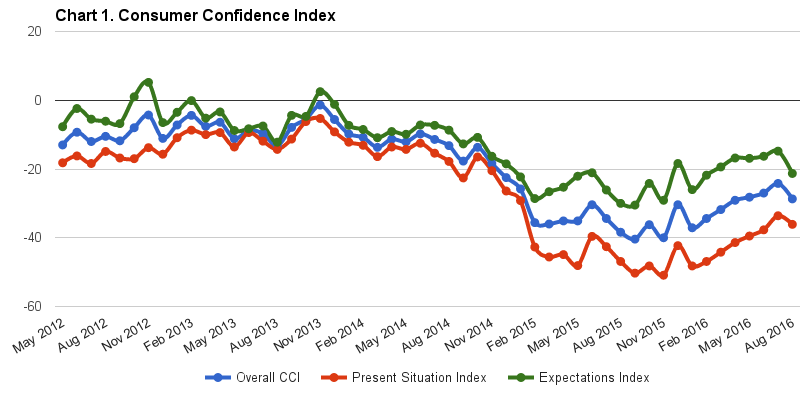 30
June
2022
30
June
2022
ISET Economist Blog
 Wednesday,
19
October,
2016
Wednesday,
19
October,
2016

 Wednesday,
19
October,
2016
Wednesday,
19
October,
2016
The CCI, which is computed by ISET-PI on a monthly basis, monitors how Georgians feel about their personal financial situations and the economic well-being of the whole country. Roughly speaking, the index is computed as the difference between the frequencies of positive and negative answers to 12 questions covering the present and expected economic situations of the households surveyed, as well as general economic parameters of the country, such as inflation and unemployment. It ranges from −100, a result that would follow if all respondents answered all questions in the most negative way, to +100, which would be the outcome if all respondents gave the most positive answers.

In countries like Great Britain, where the CCI has a history that reaches back many decades, it was found that consumer confidence is correlated with a multitude of economic variables. For instance, it is positively correlated with consumption, growth, earnings, house prices, and the value of the currency, while it is negatively correlated with interest rates and unemployment. Most importantly, movements of the CCI typically predate dynamics in the real economy, e.g., the volume of retail sales, and can thus be used as a predictor for upcoming economic developments. The CCI is therefore closely observed by various actors in the public and the private sectors. whose decision making depends on the upcoming economic climate.
In August 2016, Georgian consumer confidence went down by 4.5 points to -28.7, which is a considerable decline, interrupting an increasing trend that could be observed between January and July. Fortunately, this does not mean that Georgia is moving into a recession. As the graph reveals, the CCI showed a similar pattern in all summers since 2012. In 2012, consumer confidence went down from July to September, in 2013 just in August, in 2014 from July to September, and in 2015 from June to September. Why are there these summer blues in every year?
Consumer confidence is a subjective measure of people’s economic well-being and optimism, both of which are closely related to their overall happiness levels. And what affects happiness most strongly in the summer? Right, summer is vacation time, arguably the most pleasant period of the year for many people, and one would therefore expect happiness and optimism to soar.
It turns out, however, that the connection between happiness and vacation is much more complex. The Dutch tourism researcher Jeroen Nawijn and his colleagues measured the happiness of people (based on questionnaires) before and after their holidays (Applied Research in Quality of Life, 2010). Intuitively, one would think that after vacations, people would have recovered their depleted resources and feel revived and rejuvenated. Yet, to the contrary, Nawijn et al. found that happiness builds up during the pre-trip period and vanishes almost immediately after vacation. This goes so far that in the post-trip period no difference in happiness could be found between those who had holidays and those who skipped their vacations altogether!
This may explain the summerly CCI slump that we can see every year: overall optimism and happiness go up in anticipation of the holidays and return to their normal levels when the vacations are over.
This is bad news for those hoping to recover during their holidays. However, it gets even worse. In a famous experiment, neuroscientist Wolfram Schultz and his colleagues gave fruit juice to chimpanzees and simultaneously measured the dopamine levels in their brains (Journal of Neuroscience, 1993). Dopamine is a substance associated with happiness and joy, and the experiment therefore allowed monitoring of the happiness that ensued in the wake of fruit juice consumption. Not surprisingly, the fruit juice led to a dopamine spike in the monkey brains, which was, by the way, very sharp and short-lived. The dopamine went up and down within seconds, indicating that the joy of drinking fruit juice is fleeting.
To elicit the “joy of anticipation,” Schultz ran the same experiment, but a few seconds before the fruit juice flowed, a light flashed. After some time, the chimps grasped the meaning of the light and understood that it heralded fruit juice. Stunningly, this leads the dopamine spike to move forward in time and occur when the light went on, while no change in dopamine could be observed when the juice actually came. Anticipation beat realization.
The warm weather in June and July heralds the holiday season. People are getting positive and optimistic in anticipation of their holidays. That’s when they are happy. When holidays actually take place, there is no bliss, and soon afterward, standard misery returns. The CCI reflects these cheerless dynamics.





